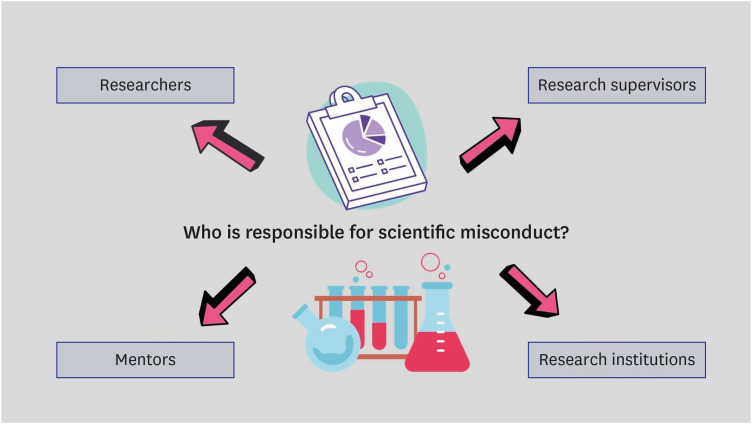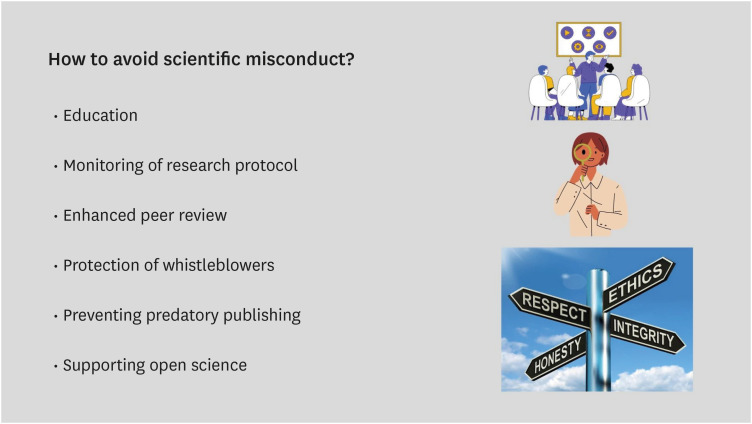J Korean Med Sci.
2023 Dec;38(47):e405. 10.3346/jkms.2023.38.e405.
Research Integrity: Where We Are and Where We Are Heading
- Affiliations
-
- 1Department of Scientific and Clinical Work, Doctoral and Master’s Studies, South Kazakhstan Medical Academy, Shymkent, Kazakhstan
- 2Department of Clinical Rheumatology and Immunology, University Hospital in Krakow, Krakow, Poland
- 3National Institute of Geriatrics, Rheumatology and Rehabilitation, Warsaw, Poland
- 4Department of Internal Medicine N2, Danylo Halytsky Lviv National Medical University, Lviv, Ukraine
- 5Department of Biology and Biochemistry, South Kazakhstan Medical Academy, Shymkent, Kazakhstan
- 6Department of Physical Medicine and Rehabilitation, University of Health Sciences, Adana City Research and Training Hospital, Adana, Turkiye
- KMID: 2548805
- DOI: http://doi.org/10.3346/jkms.2023.38.e405
Abstract
- The concept of research integrity (RI) refers to a set of moral and ethical standards that serve as the foundation for the execution of research activities. Integrity in research is the incorporation of principles of honesty, transparency, and respect for ethical standards and norms throughout all stages of the research endeavor, encompassing study design, data collecting, analysis, reporting, and publishing. The preservation of RI is of utmost importance to uphold the credibility and amplify the influence of scientific research while also preventing and dealing with instances of scientific misconduct. Researchers, institutions, journals, and readers share responsibilities for preserving RI. Researchers must adhere to the highest ethical standards. Institutions have a role in establishing an atmosphere that supports integrity ideals while also providing useful guidance, instruction, and assistance to researchers. Editors and reviewers act as protectors, upholding quality and ethical standards in the dissemination of research results through publishing. Readers play a key role in the detection and reporting of fraudulent activity by critically evaluating content. The struggle against scientific misconduct has multiple dimensions and is continuous. It requires a collaborative effort and adherence to the principles of honesty, transparency, and rigorous science. By supporting a culture of RI, the scientific community may preserve its core principles and continue to contribute appropriately to society’s well-being. It not only aids present research but also lays the foundation for future scientific advancements.
Keyword
Figure
Reference
-
1. Science Europe. Seven reasons to care about integrity in research. Updated 2015. Accessed October 2, 2023. https://www.scienceeurope.org/media/42sphgqt/20150617_seven-reasons_web2_final.pdf .2. Dinis-Oliveira RJ. COVID-19 research: pandemic versus “paperdemic”, integrity, values and risks of the “speed science”. Forensic Sci Rev. 2020; 5(2):174–187.
Article3. National Library of Medicine. Medical Subject Headings (MeSH) dictionary: ethics. Updated 2023. Accessed October 2, 2023. https://www.ncbi.nlm.nih.gov/mesh/68015871 .4. Ana J, Koehlmoos T, Smith R, Yan LL. Research misconduct in low- and middle-income countries. PLoS Med. 2013; 10(3):e1001315. PMID: 23555197.
Article5. Bouter L. What research institutions can do to foster research integrity. Sci Eng Ethics. 2020; 26(4):2363–2369. PMID: 31965429.
Article6. Rodrigues F, Gupta P, Khan AP, Chatterjee T, Sandhu NK, Gupta L. The cultural context of plagiarism and research misconduct in the Asian region. J Korean Med Sci. 2023; 38(12):e88. PMID: 36974397.
Article7. Kocyigit BF, Akyol A. Analysis of retracted publications in the biomedical literature from Turkey. J Korean Med Sci. 2022; 37(18):e142. PMID: 35535370.
Article8. Haven TL, Tijdink JK, Pasman HR, Widdershoven G, Ter Riet G, Bouter LM. Researchers’ perceptions of research misbehaviours: a mixed methods study among academic researchers in Amsterdam. Res Integr Peer Rev. 2019; 4(1):25. PMID: 31819806.
Article9. Rivera H. Fake peer review and inappropriate authorship are real evils. J Korean Med Sci. 2018; 34(2):e6. PMID: 30636943.10. Gasparyan AY, Ayvazyan L, Blackmore H, Kitas GD. Writing a narrative biomedical review: considerations for authors, peer reviewers, and editors. Rheumatol Int. 2011; 31(11):1409–1417. PMID: 21800117.
Article11. Satalkar P, Shaw D. How do researchers acquire and develop notions of research integrity? A qualitative study among biomedical researchers in Switzerland. BMC Med Ethics. 2019; 20(1):72. PMID: 31619226.
Article12. Shewan LG, Coats AJ. Ethics in the authorship and publishing of scientific articles. Int J Cardiol. 2010; 144(1):1–2.
Article13. Aliukonis V, Poškutė M, Gefenas E. Perish or publish dilemma: challenges to responsible authorship. Medicina (Kaunas). 2020; 56(3):123. PMID: 32178434.
Article14. Singhal S, Kalra BS. Publication ethics: role and responsibility of authors. Indian J Gastroenterol. 2021; 40(1):65–71. PMID: 33481172.
Article15. Sanjari M, Bahramnezhad F, Fomani FK, Shoghi M, Cheraghi MA. Ethical challenges of researchers in qualitative studies: the necessity to develop a specific guideline. J Med Ethics Hist Med. 2014; 7:14. PMID: 25512833.16. Resnik DB, Shamoo AE. Reproducibility and research integrity. Account Res. 2017; 24(2):116–123. PMID: 27820655.
Article17. Silver JK, Gavini N. The push-pull mentoring model: ensuring the success of mentors and mentees. J Med Internet Res. 2023; 25:e48037. PMID: 37227764.
Article18. Research integrity is much more than misconduct. Nature. 2019; 570(7759):5.19. Olesen A, Amin L, Mahadi Z. Unethical authorship practices: a qualitative study in Malaysian higher education institutions. Developing World Bioeth. 2018; 18(3):271–278.
Article20. Martinson BC, Thrush CR, Lauren Crain A. Development and validation of the Survey of Organizational Research Climate (SORC). Sci Eng Ethics. 2013; 19(3):813–834. PMID: 23096775.
Article21. Titus SL, Wells JA, Rhoades LJ. Repairing research integrity. Nature. 2008; 453(7198):980–982. PMID: 18563131.
Article22. Cogan E. Preventing fraud in biomedical research. Front Cardiovasc Med. 2022; 9:932138. PMID: 36093176.
Article23. Hosseini M, Hilhorst M, de Beaufort I, Fanelli D. Doing the right thing: a qualitative investigation of retractions due to unintentional error. Sci Eng Ethics. 2018; 24(1):189–206. PMID: 28321689.
Article24. Gasparyan AY, Nurmashev B, Seksenbayev B, Trukhachev VI, Kostyukova EI, Kitas GD. Plagiarism in the context of education and evolving detection strategies. J Korean Med Sci. 2017; 32(8):1220–1227. PMID: 28665055.
Article25. Gupta L, Tariq J, Yessirkepov M, Zimba O, Misra DP, Agarwal V, et al. Plagiarism in non-anglophone countries: a cross-sectional survey of researchers and journal editors. J Korean Med Sci. 2021; 36(39):e247. PMID: 34636502.
Article26. Mehta P, Zimba O, Gasparyan AY, Seiil B, Yessirkepov M. Ethics committees: structure, roles, and issues. J Korean Med Sci. 2023; 38(25):e198. PMID: 37365729.
Article27. Pich J, Carné X, Arnaiz JA, Gómez B, Trilla A, Rodés J. Role of a research ethics committee in follow-up and publication of results. Lancet. 2003; 361(9362):1015–1016. PMID: 12660062.
Article28. Gasparyan AY, Gerasimov AN, Voronov AA, Kitas GD. Rewarding peer reviewers: maintaining the integrity of science communication. J Korean Med Sci. 2015; 30(4):360–364. PMID: 25829801.
Article29. Barroga E. Innovative strategies for peer review. J Korean Med Sci. 2020; 35(20):e138. PMID: 32449322.
Article30. Bouter LM, Hendrix S. Both whistleblowers and the scientists they accuse are vulnerable and deserve protection. Account Res. 2017; 24(6):359–366. PMID: 28481674.
Article31. Mechtenberg L, Muehlheusser G, Roider A. Whistleblower protection: theory and experimental evidence. Eur Econ Rev. 2020; 126:103447.
Article32. Johal J, Ward R, Gielecki J, Walocha J, Natsis K, Tubbs RS, et al. Beware of the predatory science journal: a potential threat to the integrity of medical research. Clin Anat. 2017; 30(6):767–773. PMID: 28509358.
Article33. Beall J. Dangerous predatory publishers threaten medical research. J Korean Med Sci. 2016; 31(10):1511–1513. PMID: 27550476.
Article34. Allen C, Mehler DM. Open science challenges, benefits and tips in early career and beyond. PLoS Biol. 2019; 17(5):e3000246. PMID: 31042704.
Article35. Errington TM, Iorns E, Gunn W, Tan FE, Lomax J, Nosek BA. An open investigation of the reproducibility of cancer biology research. Elife. 2014; 3:e04333. PMID: 25490932.
Article36. Gasparyan AY, Yessirkepov M, Voronov AA, Koroleva AM, Kitas GD. Comprehensive approach to open access publishing: platforms and tools. J Korean Med Sci. 2019; 34(27):e184. PMID: 31293109.
Article37. Huston P, Edge VL, Bernier E. Reaping the benefits of Open Data in public health. Can Commun Dis Rep. 2019; 45(11):252–256. PMID: 31647060.
Article38. Wager E, Jefferson T. Shortcomings of peer review in biomedical journals. Learn Publ. 2001; 14(4):257–263.
Article39. Peh WC. Peer review: concepts, variants and controversies. Singapore Med J. 2022; 63(2):55–60. PMID: 34602311.
Article40. Bosch X. Improving biomedical journals’ ethical policies: the case of research misconduct. J Med Ethics. 2014; 40(9):644–646. PMID: 24505117.
Article41. Williams P, Wager E. Exploring why and how journal editors retract articles: findings from a qualitative study. Sci Eng Ethics. 2013; 19(1):1–11. PMID: 21761244.
Article42. Gasparyan AY, Yessirkepov M, Voronov AA, Koroleva AM, Kitas GD. Updated editorial guidance for quality and reliability of research output. J Korean Med Sci. 2018; 33(35):e247. PMID: 30140192.
Article43. Wager E. How journals can prevent, detect and respond to misconduct. Notf Rettmed. 2011; 14(8):613–615.
Article44. Memon AR. Similarity and plagiarism in scholarly journal submissions: bringing clarity to the concept for authors, reviewers and editors. J Korean Med Sci. 2020; 35(27):e217. PMID: 32657084.
Article45. Bosch X, Pericas JM, Hernández C, Torrents A. A comparison of authorship policies at top-ranked peer-reviewed biomedical journals. Arch Intern Med. 2012; 172(1):70–72. PMID: 22232152.
Article46. Al-Marzouki S, Evans S, Marshall T, Roberts I. Are these data real? Statistical methods for the detection of data fabrication in clinical trials. BMJ. 2005; 331(7511):267–270. PMID: 16052019.
Article47. Miyakawa T. No raw data, no science: another possible source of the reproducibility crisis. Mol Brain. 2020; 13(1):24. PMID: 32079532.
Article48. Gøtzsche PC. Citation bias: questionable research practice or scientific misconduct? J R Soc Med. 2022; 115(1):31–35. PMID: 35105192.
Article49. Yeo-Teh NS, Tang BL. Research data mismanagement - from questionable research practice to research misconduct. Account Res. 2023; 14:1–8.
Article
- Full Text Links
- Actions
-
Cited
- CITED
-
- Close
- Share
- Similar articles
-
- Timing of Fusarium Head Blight Infection in Rice by Heading Stage
- Factors Influencing Ego-Integrity in Community Dwelling Elders
- Mutual Reciprocal Relationship between Ego Integrity and Depression in Elderly: Multi-dimensional Influencing Factors
- Where is Archives of Plastic Surgery Now? And Where is It Heading?
- The Influencing Factors on the Ego Integrity of Elderly Living Alone



